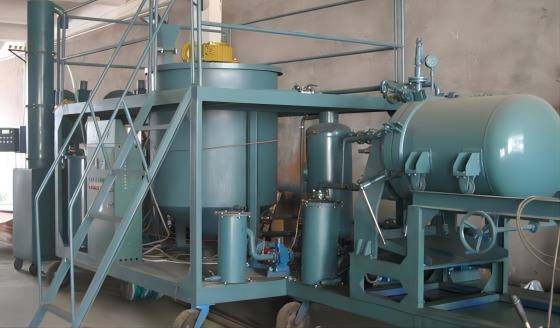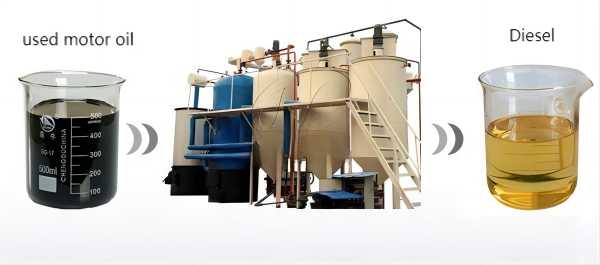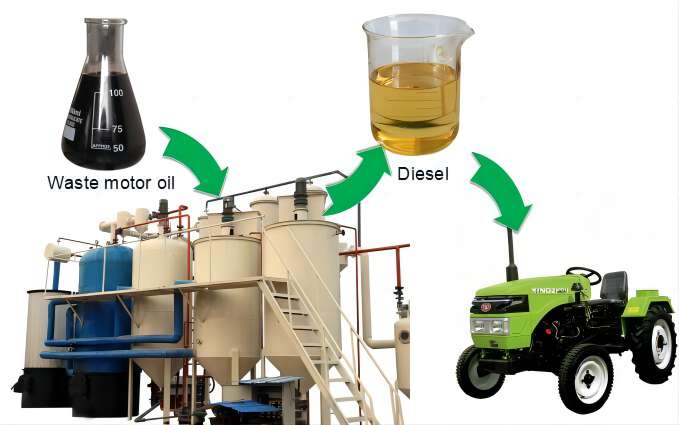Used Motor Oil Recycling: A Green Solution for a Greener Planet
Used motor oil is a common byproduct of engine maintenance and is often discarded without much thought. However, improper disposal of used motor oil can have serious environmental consequences. Fortunately, there are practical and responsible ways to recycle and dispose of used motor oil. In this article, we will explore the process of used motor oil recycling, how to get rid of it, and the various disposal options available.

Understanding Why Should Recycle Used Motor Oil
Definition of Used Motor Oil
Used motor oil is the lubricating oil that has been utilized in an engine. Over time, this oil becomes contaminated with impurities, such as dirt and metal particles, making it less effective at protecting engine components.
Composition and Contaminants
Used motor oil contains not only engine lubricants but also a range of contaminants, including heavy metals and toxic chemicals. These contaminants can have a detrimental impact on the environment if not properly handled.
Common contaminants in used motor oil include:
- Heavy metals: Lead, cadmium, and chromium are common heavy metals found in used motor oil. These metals can be toxic to humans and animals.
- PAHs: PAHs are a group of chemicals that are formed when organic matter is burned. PAHs are known to cause cancer in humans and animals.
- Benzene: Benzene is a volatile organic compound (VOC) that is found in gasoline and crude oil. Benzene is known to cause cancer in humans.
Significance of Recycling
Recycling used motor oil is essential for several reasons. First, it helps conserve valuable natural resources. Second, it reduces the risk of soil and groundwater contamination. Third, it minimizes the energy and emissions associated with refining new oil.
Steps for Recycling Used Motor Oil
Collection and Containment
The first step in recycling used motor oil is to collect and contain it properly. This can be done by following these steps:
- Drainage and storage: Drain the used oil from your engine into a clean, leak-proof container. Be sure to use a funnel to help prevent spills. Label the container clearly as “used motor oil.”
- Use of drip pans and containers: Place a drip pan under the oil drain plug to catch any drips. You may also want to place a container under the engine to catch any oil that spills.
Filtration and Cleaning
Once you have collected the used oil, it needs to be filtered and cleaned to remove contaminants. This can be done by following these steps:
- Separation of contaminants: Allow the used oil to settle for at least 24 hours. This will allow the heavier contaminants to sink to the bottom of the container.
- Filtering processes: Pour the used oil through a filter to remove any remaining contaminants. There are a variety of different oil filters available, so be sure to choose one that is rated for used motor oil.
Re-refining Process
Once the used oil has been filtered and cleaned, it can be re-refined. Re-refining is a process that removes the contaminants from used oil and produces a new base oil that can be used to make new motor oil. The re-refining process typically consists of the following steps:
- Distillation and fractionation: The used oil is heated to a high temperature, which causes the different components of the oil to evaporate at different temperatures. The different components are then collected and separated into fractions.
- Treatment and additives: The base oil is then treated to remove any remaining contaminants. Additives are then added to the base oil to improve its performance.
Quality Assurance
Once the base oil has been re-refined, it is important to test and analyze it to ensure that it meets quality standards. The base oil is tested for a variety of properties, such as viscosity, flash point, and pour point. It is also tested for contaminants, such as heavy metals and PAHs.

DIY Methods for Small-Scale Users
Small-scale users, such as homeowners and small businesses, can recycle used motor oil using a variety of DIY methods. Some common DIY methods include:
- Proper drainage techniques: Drain the used oil from your engine into a clean, leak-proof container. Be sure to use a funnel to help prevent spills. Label the container clearly as “used motor oil.”
- Use of oil absorbents: Oil absorbents, such as kitty litter, can be used to clean up oil spills.
- Local collection centers: Many auto parts stores and service stations accept used oil for recycling. You can also find a list of local recycling centers online or by contacting your local municipality.
Municipal Programs and Facilities
Many municipalities offer programs and facilities for recycling used motor oil. These programs and facilities can vary from city to city, so be sure to check with your local municipality for more information.
- Overview of local recycling centers: Many cities have central recycling centers where residents can drop off used motor oil.
- Community collection events: Some cities hold community collection events where residents can drop off used motor oil and other hazardous materials.
- Government initiatives: Some governments offer financial incentives to businesses and residents that recycle used motor oil.
Commercial Used Motor Oil Recycling
There are a number of private companies that specialize in recycling used motor oil. These companies typically offer a variety of services, such as collection, transportation, and re-refining.
- Private recycling facilities: There are a number of private recycling facilities that accept used motor oil from businesses and other large users.
- Collaborative programs with auto shops: Many auto shops have collaborative programs with private recycling companies to collect and recycle used motor oil.
- Industrial scale recycling processes: Industrial scale recycling processes are used to recycle large volumes of used motor oil from industrial sources, such as power plants and manufacturing facilities.
Benefits of Used Motor Oil Recycling
There are a number of environmental, resource, and economic benefits of recycling used motor oil.
- Environmental conservation: Recycling used motor oil helps to protect the environment by reducing the amount of oil that is disposed of in landfills and incinerators. It also reduces the need to extract and refine new crude oil, which is a non-renewable resource.
- Resource conservation: Recycling used motor oil helps to conserve natural resources by reducing the need to extract and refine new crude oil.
- Economic and energy benefits: Recycling used motor oil saves energy and money. It takes less energy to re-refine used oil than it does to extract and refine new crude oil. Recycling used oil also reduces the cost of new motor oil.
Disposal Options for Unrecyclable Oil
Some used motor oil may not be recyclable due to contamination or other factors. This oil must be disposed of properly to protect the environment and human health.
- Hazardous waste facilities: Hazardous waste facilities are designed to safely dispose of hazardous waste, including used motor oil.
- Landfills: Some landfills accept used motor oil for disposal. However, it is important to check with your local landfill to see if they accept used oil and what their requirements are.
- Professional disposal services: There are a number of professional disposal services that can dispose of used motor oil for you. These services typically charge a fee for their services.

Conclusion
Used motor oil recycling is a critical component of responsible environmental stewardship. Recycling not only conserves valuable resources and reduces pollution but also offers economic benefits. By following proper recycling and disposal procedures, individuals, businesses, and communities can contribute to a greener and more sustainable planet while complying with relevant regulations. It is our collective responsibility to ensure that used motor oil is managed in an environmentally friendly manner, and by doing so, we can make a positive impact on our environment and the future of our planet.







